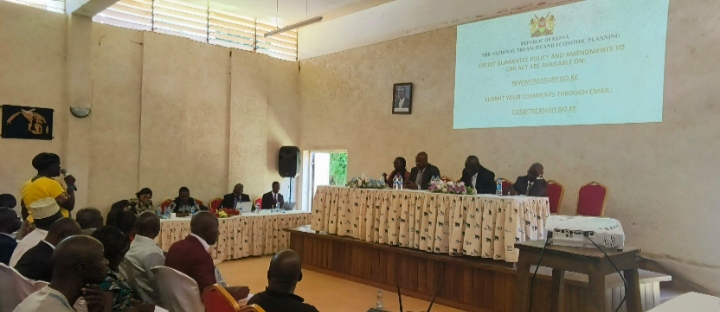Kakamega,
Tuesday, April 30, 2024
KNA by Moses Wekesa
The National Treasury is in the process of converting the Credit Guarantee Scheme (CGS) to Kenya Credit Guarantee Company (KCGC) for continuity and sustainability in supporting Micro Small and Medium Enterprises (MSMEs) to access Credit.
This follows the successful implementation of CGS under a pilot programme to address the challenges of access to finance by MSMEs.Rolled out on December 8, 2020, CGS was a risk taking sharing arrangement between the government and financial intermediaries lending to eligible MSMEs affected by COVID-19 pandemic.
The KCGC is set to address the financing gap for MSMEs that need at least Sh4 trillion which is more than the Country’s budget with the Kenyan Banks able to lend to the business people only up to Sh783 million.
“If we try to give funds as county governments or as National government to MSMEs we need at least Sh4 trillion. Kenyans Banks can only give Sh783 billion. If we put too much we will have a deficit forcing the country to borrow funds externally which is not sustainable,” he pointed out.
Speaking during a public participation exercise on the Credit Guarantee Policy and Amendments to the Central Bank of Kenya Act, the Senior Deputy Director, Financial and Sectoral Affairs at The National Treasury Ronald Inyangala said the Financing gap has impacted on MSMEs who now depend on informal lending institutions like Chamas and Shylocks whose rates are high forcing some MSMEs to operate minimally or shut down.
“Stringent loan requirements, collateral limitation, operating informally, insufficient knowledge about creditworthiness and capacity challenges on business management have impacted negatively to the potential of MSMEs,” Inyangala noted.
He said the government of Kenya and County governments have been trying to intervene and support MSMEs by establishing kitty’s like the Women Enterprise Fund, Youth Fund, Uwezo Fund but have not reached all Kenyans due to Moral Hazards where loanees fail to repay loans to be used to support others.
“Moral Hazards is where you take loans and decide not to repay. In developed countries failure to repay loans will deny you access to basic necessities like water, electricity among other services,” he noted.
“So the government is trusting MSMEs and can take that risk as a guarantor to support the MSMEs to get funds from Banks to address the challenge of market failure, where MSMEs go to banks and are not given funds due to defaults and lack of collateral,” he added.
He said financial institutions which will offer credit to MSMEs through the Credit Guarantee Scheme will benefit from Capital Relief.The Credit Guarantee Scheme programme has been done in other countries leading to transformation.
“South Korea is one of the first countries that successfully implemented the Credit Guarantee Scheme in 1972, the programme enabled them to advance in technology which spurred economic growth,” he noted.
The scheme provides an incentive to enable lending institutions to extend credit to MSMEs at favorable terms like reduced collateral, longer tenure and lower interest rates.
Since its roll out, the Credit Guarantee Scheme has supported over 4108 MSMEs operating in 46 counties to access over Sh6.26billion credit enabling them to create over 25,703 jobs in Kenya.
Inyangala noted that the government is aware that MSMEs are a key driver to Kenya’s economic development and job creation accounting to nearly 40 per cent of Kenya’s Gross Domestic Product (GDP) and employing over 15 million people across all the 47 counties.
“In 2022, the MSME sector alone created over 700 000 jobs which constituted 86.1 per cent of all new jobs in the market,” he disclosed.
He said the Kenya Credit Guarantee Company which will be established under the Company’s Act 2015 will have both public and private equity ownership to enhance its sustainability and greater impact in supporting MSMEs.
“Mixed ownership will ensure the company can mobilise more capital for use in guaranteeing credit access to more MSMEs across the country,” he added.
Courtesy; KNA





